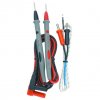I read if you turn the selector dial a full turn, it fixes it.
That didn't fix it. It still jumped from hundreds to negatives while trying to get the lead-to-lead # to subtract from the coil reading. It also jumped from hundreds to negatives when trying to read the coil resistance.
I spun the dial like 3 times with the multimeter on, and stopped it at 200 ohms to check the coil.
That didn't fix it, and I got the same jumping #'s result.
I took a lighter to the leads, heated them up and then wiped them clean while they were hot, hoping it would remove any manufacturing resides and/or somehow make the metal more conductive.
That sort of fixed it for a short time.
I got the lead-to-lead resistance to stay at 1.0, and then a brand new unused 1.8 kanger T3 head read 3.0, so either the coil's really 2.0 ohm or the meter's off by .2.
I bought one for myself and another for someone else, and this temporarily fixed both, but now they're back to jumping all over, so I'm returning them.
There are many different brands on the net that are the same design as this, just with different colors, so I'm staying away from those too.
Sometimes HF gives these away free with any purchase, what a great busines strategy to hand out defected items, but really, I think most consumers are using these to read volts of things like
batteries and outlets, so no-one really complains. I read that volts are more accurate than testing resistance (ohms), so unlike the problems reading resistance ohms, it should at least accurately read PV battery volts.
It's not worth guessing if the reading's right if you don't have a stock-built/known- resistance coil to use as a referance. You're better off asking the forum what ohm = how many # of wraps with the gauge wire you're using.



